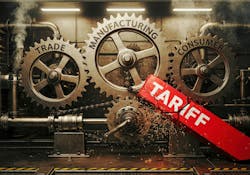Are U.S. Tariffs Leading Some Manufacturers to Look Elsewhere?
A new report from Revalize, a supplier of CAD and PLM software for manufacturers, focuses on how geopolitical tensions, including tariffs, trade disputes and ongoing military conflicts are reshaping manufacturing strategies and operations. The report is based on a survey of 500 respondents at manufacturers in the United States, Switzerland, Austria and Germany.
Three major areas of disruption noted in the report include:
- 85% of global manufacturers are restructuring supply chain strategies in response to geopolitical instability.
- More than half of global manufacturers (53%) are experiencing increased production costs due to recent geopolitical events.
- 50% of global respondents are facing higher overall costs linked to new tariffs and global compliance regulations.
To maintain profit margins, the report states that 52% of global manufacturers have actively reduced their reliance on suppliers in high-tariff regions, signaling a major shift toward regionalization and supply chain diversification. Furthermore, Revalize’s research found that one in five international manufacturers have exited the U.S. market in the past year due to political and economic instability. This places the U.S. among the top three markets companies are withdrawing from. The other two markets in the top three are China (22%) and Russia (30%).
The research also notes that 54% of U.S. organizations responding to the study reported substantial revenue declines over the last 12 months, underscoring the widespread economic ripple effects of geopolitical disruption.
In response to these new operating realities for manufacturers, Revalize said more manufacturers are accelerating digital transformation efforts to protect profitability, with AI playing a central role. Over half (51%) of global respondents are adopting AI to enhance supply chain and inventory management and 50% are using AI to optimize operational processes.
Additional findings from the report include:
- 48% of global manufacturers have diversified their supplier base or reduced dependence on single-country sourcing, while 44% are implementing more strategic sourcing to mitigate risks and increase resilience.
- 47% of global manufacturers are prioritizing suppliers with advanced technology capabilities to remain competitive.
- If economic uncertainty persists, 52% plan to further diversify supply chains, 41% aim to strengthen supplier relationship management, 37% intend to invest in new technologies and 36% are exploring localization of production.
“Manufacturers are under intense pressure as global instability and shifting trade policies have created a new and more complicated playing field,” said Mike Sabin, CEO of Revalize. “From tariffs to supply chain uncertainty, these challenges are forcing leaders to make difficult decisions that impact operations and strategies for long-term growth.”
Access the full report from Revalize.

